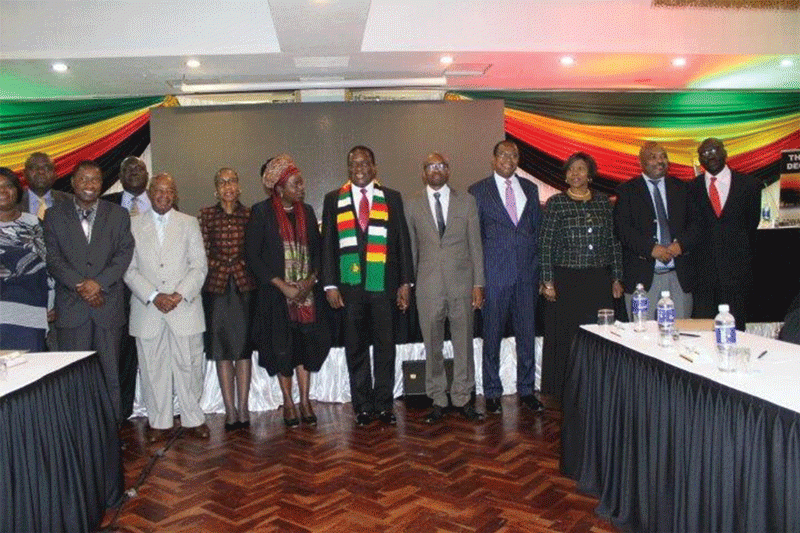
THE Tripartite Negotiating Forum (TNF), which was legislated in June 2019 amid pomp and fanfare, is finally gaining traction after hitting turbulence characterised by disputes, finger –pointing and walkouts.
The TNF is a social dialogue platform that brings together government, business and labour to negotiate key socioeconomic matters. It has been in existence since 1998 initially as a voluntary and unlegislated chamber in which socioeconomic matters were discussed and negotiated by the partners.
This was evidenced by the three social partners finally finding common ground last month and agreeing to a threshold minimum wage across all sectors of US$150 in either hard currency or in local currency at the interbank rate. This breakthrough came after a long impasse between government and labour on the one hand and business on the other.
Business had for a long time disagreed with its TNF partners over having a national minimum wage by indexing a portion of the August 2018 poverty datum line to the exchange rate.
“This approach threatens a re-dollarisation of the economy because the US dollar becomes the point of reference for all pricing, including wages. The TNF has already agreed that the economy must run with the local currency with a proviso that the authorities will commit to local currency stabilisation and contain money supply to targeted levels,” organised business representative Employers’ Confederation of Zimbabwe (Emcoz) said in its argument against the proposal.
“The ghost of the US dollar which continues to influence our pricing, including wages, needs to be exorcised from our minds if the transition to local currency is to become a reality.”
Business also shot down the proposal of the TNF being involved in the collective bargaining process pointing out that the responsibility of collective bargaining lies with the national employment council (NEC).
The demand for wages in forex was prompted by the rapid depreciation of the Zimbabwe dollar introduced in 2019. The decline in the value of the local unit against the greenback precipitated high inflationary levels severely eroding incomes of most workers who are paid in the local unit amid skyrocketing prices of goods indexed against the United States dollar.
- NoViolet Bulawayo’s new novel is an instant Zimbabwean classic
- COP27: Zimbabwe’s opportunity to shine
- Jah Prayzah, Zanu PF rekindles ‘lost love’
- Female politicians complain over sexual harassment
Keep Reading
The standoff in the legislative body came to a head when labour at times boycotted the TNF meetings citing the lack of seriousness by both government and business in addressing the issue of eroded wages.
“We members of organised labour made up of the Zimbabwe Congress of Trade Unions, the Zimbabwe Federation of Trade Unions and Apex Council would like to express our displeasure with the proceedings at the Tripartite Negotiating Forum and in particular, the lack of seriousness by both government and business when it comes to the issue of addressing eroded wages and salaries crisis, hence our decision not to participate in the TNF of 17 December 2020," Labour wrote in a letter signed by all three labour unions to justify the boycott of one meeting.
"We note that the working people of Zimbabwe have suffered immensely as wages and salaries have failed to keep pace with the inflationary trends. The situation has worsened rendering it practically impossible for workers across all sectors to earn the current salaries and sustain their families or be able to go to work. In spite of this, the TNF has failed to address the matter and it is our collective position that the TNF must find a permanent solution on the issue of eroded wages and salaries.”
However, there is hope after the agreement on the minimum wage that partners in the TNF will find each other.
“We have started getting some traction at TNF. We would like the momentum to continue and have discipline among social partners,” Emcoz president Demos Mbauya said in an interview.
“There is a genuine desire among social partners to continue driving social dialogue.”
However, headwinds remain that threaten the uneasy truce among the social partners.
At the Emcoz annual congress held in Victoria Falls last week, both labour and business spoke strongly against government’s failure to consult them before imposing damaging policies.
Mbauya pointed out that there was a need for fiscal and monetary authorities to engage social partners through the Tripartite Negotiation Forum (TNF), before promulgation and implementation of major policy initiatives.
Both Zimbabwe Congress of Trade Unions (ZCTU) president Florence Taruvinga and Zimbabwe Federation of Trade Unions (ZFTU) secretary general Kenias Shamuyarira concurred with Mbauya on concerns over the government’s failure to consult before putting in place policies that had an adverse impact on both workers and business.
“It is hypocritical for the government to unilaterally force down the policies on people without TNF engagement. We are being undermined. It is on record that we pointed out that the government has been trivialising the TNF and taking people for granted for some time by undermining social dialogue,” Taruvinga said.
Shamuyarira added that it took business and labour to ask for the intervention of Mnangagwa to get the government representatives to attend last week’s TNF meeting.
Although the TNF has finally gained traction, there is still a long uneasy road ahead.
Follow us on Twitter @NewsDayZimbabwe










